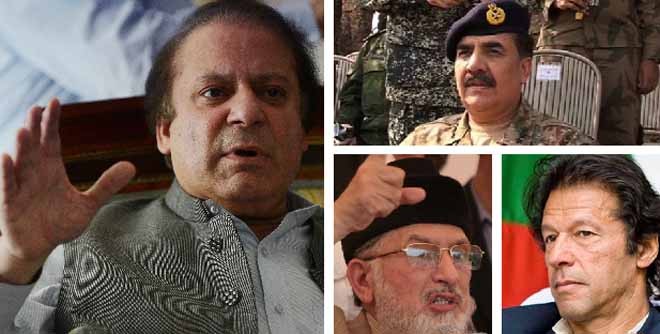
Going by the fact that the Sharifs met the army chief four times in one week means a new template of semi-legal framework has been created

The dust kicked up by the sum total of these political campaigns is far from settled and even in the best case scenario deal between the protagonists it will take time for the implications to form shape. Ditto for the worst case scenario. Whatever the outcome, the fortunes of the various stakeholders have already undergone changes in the course of the last fortnight.
So, who’s gained and who’s waned in this rhetorical and theatrical upheaval and how has it already, and will up ahead, impact each one of them, and others?
Much airtime and column inches have been devoted in recent years, months and weeks to the debate on how the military’s fared in recent years in its project to retain its primacy over the polity.
All the hard-won gains of the Charter of Democracy and the Eighteenth Amendment have come to naught with Nawaz Sharif and his PML-N frittering away the political capital the democratic forces had painstakingly accumulated, with a triad of mistakes: (1) a suicidal pursuit of an intangible and poorly executed trial of Musharraf, (2) a misplaced Punjabi tribal application of state power on the Qadri camp in Model Town, and (3) an astonishingly incompetent miscalculation of Imran Khan’s political ‘my way or the highway’ machismo.
Net result: the military is not just back where it was around the start of 2007 but going by the fact that the Sharifs met the army chief four times in one week to elicit his support in the ongoing crisis means a new template of semi-legal framework has been created that mandates military advisory on political decisions. What the Sharif brothers have just accomplished takes exceptional talent: not just betraying the mandate of their impressive vote bank that gave them a majority in parliament but pawning away a large part of the political capital of the democratic forces in general in the bargain.
There is little doubt the Sharifs in particular and the PML-N in general will pay a steep political price for this going forward. Considering that they are now also beholden to all opposition parties in parliament (minus PTI) for depending on their support for political survival by the skin of their teeth, they are the major losers in the current crisis.
And considering that the military can use a mere tweet from the ISPR to publicly demonstrate its primacy as the final arbiter of battles among political forces without eliciting even a feeble whimper makes the military the biggest winner in this crisis.
Arguably, though, not all is lost. The optimist -- and there are quite a few of them -- insist the proverbial glass is half full. They point out that while many find fault with Imran Khan’s theatrical tactics, and the more organised but less politically legitimate manoeuvers of Tahirul Qadri, the case and pressure for radical political and electoral reforms they have made can only serve to strengthen the national democratic project. The trick is to agree on their logistical roadmap by divorcing histrionics as a framework of implementation, such that the whole parliament does not end having to pay the price of erring external stakeholders.
That there is an existing consensus, both within and outside parliament, on deep electoral reforms is no trifling political miracle. That all the political forces in parliament had already set up a representative committee, inclusive of PTI, of both the Senate and National Assembly, to draft and constitutionally encode the gamut of these reforms even before the long marches set off from Lahore, is the collective political wisdom that may well end up being the mechanism that salvages the threat to democracy right now. How can this not but be celebrated by the purists if not the proletariat?
That a proportionately much bigger representative political circle compared to non-parliamentary but influential constituency like Qadri’s is willing to engage the latter for reforms that may undermine some of the interests of the former, is but a symbol of hope that pluralisms are being accepted and strengthened.
This chalks up a big bright one up for the political forces. How could the sight of a hearty thumping of desks last week in the National Assembly, inclusive of the entire opposition (minus PTI, which was camped out) for the beleaguered prime minister not move most except the chronic cynics? For those who understand, the thumping was not necessarily for the leader of the house but for the parliament’s conceptual sovereignty to select its leader rather than scriptwriters and dictators outside its building that even the military pledged it would protect.
This simultaneously makes winners out of both the political and democratic forces represented in the parliament and outside, as well as the people who have consistently voted for them, or stumped for them, despite unceasing poisonous propaganda perpetuated against them by forces inimical to a democratically sovereign Pakistan.
Irrespective of whether the prime minister steps down or not, the legislatures agree to go back to the people for new mandates based on freshly enacted electoral reforms or not, the pressure for the much hyped change could yet throw up a political prize that makes winners out of all stakeholders. Remember the final deal will not be between PML-N and PTI/PAT -- because all political forces in and some outside parliament are involved. Any final deal should work because there will be virtually no one losing. The State is likely to accept this and call it a victory. It will mean making pragmatists out of us instead of idealists but it will be better than being pessimists!